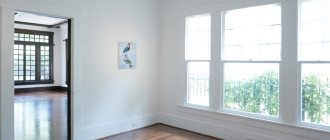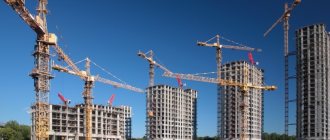What threat do ground floor apartments pose?
On the first floors, the air circulates much weaker, and strong humidity and shade predominate. Such an atmosphere contributes to the emergence and rapid proliferation of fungi and bacteria, which thrive in such a climate, and, having settled in concrete coverings, gradually penetrate into the apartment, furniture and, ultimately, into our lungs. Their spores can provoke not only a mild allergic reaction, but also quite serious diseases - pneumonia and bronchitis.
Car exhaust gases can saturate the air and vegetation with all sorts of harmful substances that negatively affect the health of the person who inhales this dust.
So, living on the ground floor, you will encounter three unpleasant moments: the smell of the basement, periodically appearing mold and polluted air.
The best thing you can do when living downstairs is to constantly ventilate your apartment and wet clean the room more often.
If you live near the road, you can hardly do without artificial air ventilation using all kinds of ionizers and purifiers. In this case, artificial purification will have a much better effect on your health than the natural atmosphere.
Which floor is better to choose in a new building: advice from doctors
Doctors note at what altitude it is optimal to live if you suffer from various diseases or are very sensitive to negative environmental factors:
- Residents of lower floors are more susceptible to cardiovascular diseases;
- The first floors can be damp, and insufficient ventilation leads to ARVI and colds;
- If you suffer from asthma or epilepsy, it is not recommended to buy property above the 7th floor;
- In new apartments, where the elevator works without interruption, people with hypertension and disabilities can choose any floor, but it is better to opt for apartments up to the 8th floor.
You should consult with your doctor to understand which floor to buy an apartment on if you suffer from various diseases.
Video 2.
Which floor is better to live on? Doctor's advice
Why is it bad to live very high too?
Environmentalists know that the air on the upper floors is not at all as clean as is commonly thought: in almost every city there are large and small enterprises that have pipes from which air that is not at all clean comes out. Naturally, harmful substances will accumulate at altitude, and especially if the wind blows in your direction.
Besides air, there is also an enemy that we cannot see - electromagnetic radiation. Of course, such radiation equally comes from electrical appliances on both the 2nd and 17th floors, but the design of the house does not allow this radiation to escape outside, so it circulates throughout all floors, rising higher and higher.
Is it worth buying an apartment on the top floor?
Author Maria Malich
12.06.2019 14:48
Real estate
As a rule, when purchasing housing in apartment buildings, potential buyers pay attention to the middle floors. But the advantages of an apartment located on the top floor even outweigh its disadvantages, but in order to make the final choice you need to find out about them in more detail.
2 shared
What to pay attention to
- Age of the house. The earlier the house is built, the greater the likelihood of problems with communications and the roof.
- Proximity to the elevator shaft. Ideally, the elevator mechanism should be located on the technical floor, otherwise residents will be bothered by constant noise and vibration.
- Availability of a technical floor. Its absence can lead to unbearable heat in the apartment in the summer.
- Roof condition. It is necessary to find out when the last time a major roof repair was carried out. If it’s been a long time, the first rain will cause a lot of problems.
- Presence of mold. Indicates problems with ventilation.
Advantages of an apartment on the top floor:
- No upstairs neighbors. Everything is obvious here: no noise, no flooding, no dumping of garbage.
- Lower cost. Owners of apartments on the top floors often give good discounts to buyers.
- The sound of the sewer. On the upper floors you can't hear the neighbors' pipes draining.
- Sport. Going up to the top floor every day can be a good exercise.
- Possibility of redevelopment. After approval, an apartment in a new building can become a two-level penthouse, and if there is a technical floor on top, it can become an additional storage room.
- Quieter and cleaner. Residents of the top floors will not be disturbed by loud companies, and exhaust fumes from passing cars will not reach them either.
Disadvantages of apartments on the top floor:
- Supplement for upper floor. If in typical new buildings apartments on the top floors are sold at a discount, then in new buildings they may ask for more for such an apartment, especially if it is equipped with a Masandra.
- High. The elevator in the house may break down and you will have to travel the whole way on your own, and this is especially problematic for older people, those with health problems and families with small children.
- Plumber visits. Plumbers may periodically pay a visit in order to “blow out” the system before the start of the heating season or if one of the residents’ radiators are not heating well.
- Taking care of the technical floor. Before buying, in addition to the apartment itself, it is worth carefully studying the technical floor: if the roof is leaking above it, then after some time moisture will enter the apartment, and if it is not heated, then the apartment will be cold in winter.
- Water pressure. Residents of new buildings are unlikely to encounter this, but in ordinary high-rise buildings a weak pump may be installed, which is why there will be weak water pressure in apartments on the top floor.
- Problems with the roof. No matter how sad it may sound, “the rescue of drowning people is the work of the drowning people themselves,” and in case of problems with the roof, the residents of the upper floors will first have to run through the authorities.
- Ventilation problems. This can lead to mold on the walls and foreign odors in the apartment. And here there are two possible solutions: either to precipitate the housing office, or to do the ventilation yourself.
- Photo: bkn.ru
Subscribe to the channel “Truth of Real Estate”, we will be the first to know about many things)
Which floors are the most comfortable?
The community of psychologists and ecologists confidently declare that the best floors for living are 5 and 6, especially if you have a child. At the same time, the apartment must have a good view from the window: looking at a brick wall or the house opposite, you and the child will more often be in a bad mood than if there was an atmospheric landscape in the window, and besides, the obstacle in front of the window will not allow the light to fully penetrate.
Try not to choose apartments with a view of the road, as this will affect not only your physical health due to dust and exhaust, but also your psychological health - constant noise will be your companion at home.
If you have the opportunity, when choosing an apartment, use clear criteria: 5-6 floor, beautiful landscape from the window - a park or water, which smooth out unpleasant consequences for the body and are a kind of filter that purifies the air.
Which floor should I choose to live on?
This question interests all future property owners. So, what is the best floor to live on?
The higher the apartment is located, the more expensive it is. The difference in cost between the last and first levels sometimes reaches 50-70%. Street noise and traffic fumes are annoying on the ground floor, but without an elevator it is more difficult to get upstairs.
There is an opinion that the first and last floors are the most inconvenient. Whether this is true for modern new buildings, we will consider further.
Dear height
Today, on the first floors of new houses there are usually commercial premises (offices, cafes, pharmacies, dry cleaners, etc.), social service facilities (clinics, kindergartens, doctors' offices, etc.), as well as built-in garages. Therefore, the first residential floor is rarely “extreme”.
But in some cases, the first floors are also left as residential areas. This is done, for example, in the suburbs (residential areas with favorable ecology) or in residential complexes of the highest categories (“elite” and “business”), which are built in prestigious locations and have a closed courtyard area, isolated from neighboring houses and the roadway.
Also, today the upper floors are not the last - there are technical rooms. Residents of high-rise buildings in old buildings suffer the most from the fact that the water pressure here is often much lower than on the lower floors. Now, according to developers, modern technical solutions eliminate this problem. Although you can still read negative reviews on the websites of real estate investors, this most often concerns houses from the “austerity” category, where developers minimize costs as much as possible. So which floor should you choose for comfortable living?
First floor
The bad thing is that thieves can get in there, so it’s unsafe. The bars installed on the windows worsen the view and darken the rooms. In addition, sounds from the street are heard, dampness is felt, external odors reach, and insects bother you. There is much more dirt on the lower landings than at the top.
However, the first floor is preferred by older people and people with disabilities. This category of residents pays attention to the cleaning of the area and whether there are convenient gatherings in the house. The first floors attract young mothers who often walk with their children, people who have always lived on the first floors and do not want to change their habits, as well as those who are afraid of elevators and heights. Some people want to protect themselves in case of fire or other troubles. In this case, it is much easier to leave an apartment on the first floor than, say, on the 10th.
Taking into account that elevators in many new buildings sometimes do not work for some time after moving in, or even break down, the first floor is quite attractive. In addition, we should not forget about those for whom apartments on higher floors are currently unaffordable.
Second floor
Its advantage compared to the first floor is that fewer visitors to the house pass by your apartment (especially if there is an elevator); the apartment rooms on the second floor are almost not visible from the street. But there is also a specific drawback: if the ground floor is rented for commercial use (for example: a club, a store, a cafe), living on the second level is worse than on the first - there are unpleasant odors, noise, and even cockroaches.
Third – fifth floors
In terms of location, these floors are quite attractive. If the elevator breaks down, it is not very difficult to climb; bringing in furniture and building materials for repairs will cost much less than to the upper floors. At this level there is no dampness, which means there are no insects; only the residents of the house opposite can look into the windows, but this is possible on any floor. In case of fire, fire escapes easily reach here, you can jump onto the rescue awning. In addition, the fifth floor for living is not the height that people who are obsessed with the fear of heights are afraid of.
Sixth – tenth floors
For many, this area is ideal. At such a height, exhaust gases are not felt, trees in cities do not grow above the sixth floor, so light penetrates into the apartment unhindered. The only pity is that with each floor, lifting heavy objects becomes more and more expensive, and sounds from the street can still be heard.
Tenth - fifteenth floors
The “lower” flaws have almost disappeared. Unless car alarm sirens can disturb new residents. But it is from this height that the disadvantages inherent to this level appear.
A broken elevator is now a serious problem. There is no smell from exhaust gases in the apartment and the rooms are bright, but the fear of heights is already present. Cleaning windows yourself is scary. Although the fire escapes still reach here. And the most important thing is children, who cannot be left unattended at the window or on the balcony.
Sixteenth floor and above
It’s warm and light, and flies don’t bite, and there’s a beautiful view from the balcony. There is no dust, no noise, no smell. You can build an exit to the roof (outermost floors). But admiring the landscape from the window is not an activity for the faint of heart; failure of the elevator becomes a nightmare, and in the event of a fire, there are problems with access to the yard. In general, it is difficult to extinguish fire in skyscrapers.
And wiping windows somewhere at the 20th floor level is dangerous even for those who are not afraid of heights - and a healthy person can feel dizzy.
Everyone has their own priorities when choosing an apartment. Today, developers offer a wide variety of options - from skyscrapers to low-rise complexes. So, for every product there is a buyer.
In contact with










